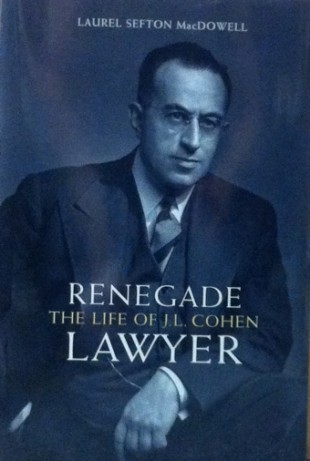by Laurel Sefton Macdowell, Professor of History, University of Toronto. Published with the University of Toronto Press, 2001.
J.L. Cohen, one of the first specialists in labour law and an architect of the Canadian industrial relations system, was a formidable advocate in the 1930s and 1940s on behalf of working people. Cohen is best described as a ‘radical lawyer.’ He was very much a ‘labour intellectual,’ comparable to the powerful group of lawyers supporting Roosevelt’s New Deal in the United States. In this tradition, he wrote Collective Bargaining in Canada, advised the Ontario government about policy issues such as mothers’ allowances, unemployment insurance legislation and labour law, and served on the National War Labour Board during World War Two.
A Marxist and a Jewish immigrant, Cohen’s commitment to the labour movement resulted partly from this background but was deepened by his experience of the Depression of the 1930’s; his ethnic origins and politicial views subjected him to ongoing discrimination. Although respected professionally, he had a knack for making enemies. At the end of the war, he was convicted of a criminal charge, was disbarred, later reinstated and died suddenly in 1950 at the age of fifty-three. Although Cohen rose to the top of his profession, he had an agonizing private life which contributed to this personal disgrace and professional downfall. His obituary in the Globe & Mail described him as a dynamic, sharp-witted man who rose from humble beginnings to become the most influential labour lawyer in Canada. It concluded with what may be a fitting epitaph, ‘He championed all the wrong people for all the right things.’


